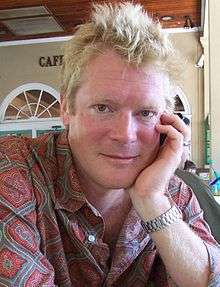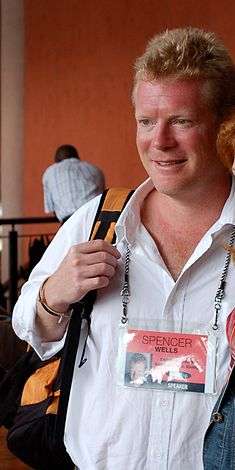Spencer Wells
| Spencer Wells | |
|---|---|
 Spencer Wells | |
| Born |
April 6, 1969 Marietta, Georgia, USA |
| Citizenship | American |
| Fields | Genetics (biologist) |
| Alma mater |
University of Texas at Austin Harvard University |
| Notable awards | Kistler Prize (2007) |
Spencer Wells (born April 6, 1969) is a geneticist, anthropologist, author, entrepreneur, adjunct professor at the University of Texas at Austin, and owner of Antone's, an iconic nightclub in Austin, Texas. He led The Genographic Project from 2005 to 2015, as an Explorer-in-Residence at the National Geographic Society.
Biography
Youth and education
Born in Marietta, Georgia, Wells grew up in Lubbock, Texas.[1] After graduating from All Saints School and Lubbock High School, he obtained a Bachelor of Science in Biology from the University of Texas at Austin in 1988, and a Ph.D. in Biology from Harvard University in 1994. He was a postdoctoral fellow at Stanford University between 1994 and 1998, and a research fellow at the University of Oxford between 1999 and 2000.
Career

Wells did his Ph.D. work under Richard Lewontin, and later did postdoctoral research with Luigi Luca Cavalli-Sforza and Sir Walter Bodmer. His work, which has helped to establish the critical role played by Central Asia in the peopling of the world, has been published in journals such as Science, American Journal of Human Genetics, and the Proceedings of the National Academy of Sciences.
Wells is renowned for his logistically complex sample-collecting expeditions in remote parts of the world. EurAsia98, which in 1998 took him and his team from London to the Altai Mountains on the Mongolian border, via an overland route through the Caucasus, Iran and the -stans of Central Asia, was sponsored by Land Rover. In 2005 he led a team of Genographic scientists on the first modern expedition to the Tibesti Mountains in northern Chad, and in 2006 he led a team to the Wakhan Corridor on the Tajik-Afghan border. His work has taken him to more than 100 countries.
He wrote the book The Journey of Man: A Genetic Odyssey (2002),[2] which explains how genetic data has been used to trace human migrations over the past 50,000 years, when modern humans first migrated outside of Africa. According to Wells, one group took a southern route and populated southern India and southeast Asia, then Australia. The other group, accounting for 90% of the world's non-African population (some 5.4 billion people as of 2014), took a northern route, eventually peopling most of Eurasia (largely displacing the aboriginals in southern India, Sri Lanka and Southeast Asia in the process), North Africa and the Americas. Wells also wrote and presented the 2003 PBS/National Geographic documentary of the same name. By analyzing DNA from people in all regions of the world, Wells has concluded that all humans alive today are descended from a single man who lived in Africa around 60,000 – 90,000 years ago, a man also known as Y-chromosomal Adam.[3]
From 2005-2015, Wells led The Genographic Project, undertaken by the National Geographic Society, IBM, and the Waitt Foundation,[4] which aimed to create a picture of how our ancestors populated the planet by analyzing DNA samples from around the world.[5] The project is credited with creating the personal genomics industry.
He has presented the results of his work around the world, including at the 2007 TED conference, where he spoke specifically about human diversity.[6] Wells was a keynote speaker at the Science & Technology Summit in The Hague on November 18, 2010. He also gave the keynote address at the University of Texas College of Natural Sciences commencement exercises on May 21, 2011.
Wells was one of the keynote speakers at the Southern California Genealogical Society (SCGS) Jamboree that was co-sponsored by the International Society of Genetic Genealogy (ISOGG) on June 3, 2013. The focus was on Family History and DNA: Genetic Genealogy in 2013, where he was quoted as saying:
Since 2005, the Genographic Project has used the latest genetic technology to expand our knowledge of the human story, and its pioneering use of DNA testing to engage and involve the public in the research effort has helped to create a new breed of "citizen scientist." Geno 2.0 expands the scope for citizen science, harnessing the power of the crowd to discover new details of human population history.[7]
Awards and honors
- National Merit Scholar
- Phi Beta Kappa
- National Geographic Explorer-in-Residence
- Kistler Prize
- Outstanding Young Texas Ex
- Frank H.T. Rhodes Class of '56 Professorship, Cornell University
- Distinguished Alumnus, College of Natural Sciences, University of Texas at Austin
Books
- The Journey of Man: A Genetic Odyssey, 2002 (Penguin, UK; Princeton University Press and Random House, US; Fischer Verlag, Germany; Longanesi, Italy; Oceano, Spain/Latin America; Ucila International, Slovenia; Dokoran, Czech Republic; Akkord, Hungary; Oriental Press, China; Basilico, Japan; ScienceBooks, Korea; Yurt, Turkey; CD Press, Romania; Alpina, Russia)
- Deep Ancestry: Inside the Genographic Project, 2006 (National Geographic)
- Pandora's Seed: The Unforeseen Cost of Civilization, 2010 (Random House, US; Penguin, UK; Contact, Netherlands; Codice, Italy; Eksmo, Russia; Nika Center, Ukraine; Commonwealth, Taiwan; Eulyoo, Korea; Kagaku-Dojin, Japan; Shanghai BBT, China)
Films
- 2000 – The Difference (Channel Four, UK)
- 2002 – The Real King and Queen (Discovery Channel)
- 2003 – Journey of Man (PBS/National Geographic Channel) – CINE Golden Eagle award
- 2004 – Quest for the Phoenicians (PBS)
- 2005 – Search for Adam (National Geographic Channel)
- 2007 – China's Secret Mummies (National Geographic Channel) – nominated for Outstanding Historical Programming Emmy
- 2009 – The Human Family Tree (National Geographic Channel) – nominated for Outstanding Science and Technology Programming Emmy
See also
References
- ↑ Wells, Spencer The Journey of Man: A Genetic Odyssey (Random House, 2003), p. 93; originally published by Princeton University Press, 2002.
- ↑ The journey of man: a genetic odyssey – by Spencer Wells – Princeton University Press, 2002 (Digitised online by Google Books), ISBN 0-8129-7146-9
- ↑ "Documentary Redraws Humans' Family Tree". News.nationalgeographic.com. Retrieved October 12, 2010.
- ↑ "Waitt Foundation". Waitt Foundation. Retrieved October 12, 2010.
- ↑ Wells, Spencer (July 2007). "Out of Africa". Vanity Fair. Retrieved October 12, 2010.
- ↑ "Spencer Wells builds a family tree for humanity". TED (conference). Retrieved October 12, 2010.
- ↑ Wells, Spencer (2013). "The Genographic Project and the Rise of Citizen Science". Southern California Genealogical Society (SCGS). Retrieved July 10, 2013.
External links
| Wikimedia Commons has media related to Spencer Wells. |
- Spencer Wells on Facebook
- Spencer Wells on Twitter

- Spencer Wells on Instagram
- Spencer Wells at the Internet Movie Database
- The Genographic Project
- Cover article from the December 2004 issue of Discover
- Interview about Genghis Khan's Y-chromosome on Radiolab
- Interview in PLoS Genetics
- Interview on The Colbert Report
- Interview on The Daily Show